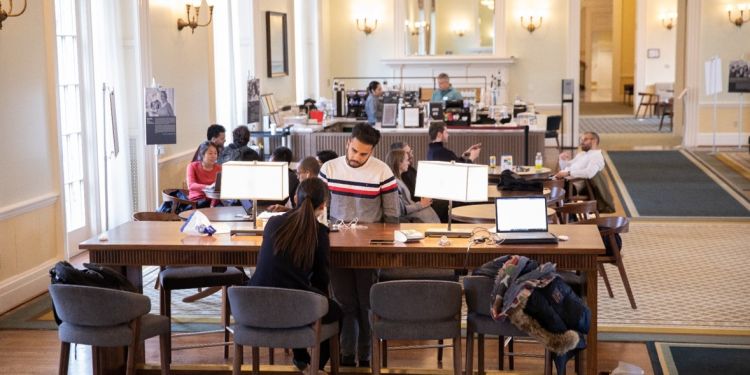Many HBS students extend their learning beyond the classroom through faculty-supervised Independent Projects (IPs). IPs take many forms—for example, students have advised companies on their sustainability strategies, written business plans for environmental ventures they would like to launch, and co-authored teaching cases with faculty. We talked with Drew Keller (MBA 2022) who completed three Independent Projects while at HBS.
You completed an Independent Project (IP) with Professor George Serafeim. What inspired you to pursue an IP? How did you know that it was the right decision?
Deciding whether or not to pursue an Independent Project really depends on what students want to get out of it. Going into it, I had a few ideas of what I wanted to get out of the experience and I had a relatively clear picture of what I wanted to focus on and build expertise around. But it was a struggle because there were also courses that I wanted to take, so I ended up taking 16.5 credits my fall semester to be able to do both.
I got to know Professor Serafeim during my RC year, which is how I learned about his Impact Weighted Accounts project. The project was more or less exactly what I was looking to do outside of traditional coursework. I had actually worked with Impact Weighted Accounts tangentially during my internship the summer before, so I had a chance to get to know the team and I knew what they're working on, so I approached them with some project ideas. I ended up completing three IPs- two with George Serafeim, and one with Nien-He Hsieh.
Tell me a little bit about the process for students who are considering an IP.
If you start early, which is in August for the fall semester, you can approach it with a broad idea of what you’d like to pursue. A large part of the IP process is defining the deliverable, which you have to submit a proposal for and which you may have to revisit and refine for faculty approval. A common deliverable is writing a case with a professor; other deliverables I’ve seen are project or policy proposals, working papers, or presentations. Ultimately, it will be up to you, the company, and the faculty to determine what is most useful for the organization.
If you’re still exploring options and need some ideas, there is a list of IP project proposals submitted by faculty who have already identified a company and a question they’re grappling with.
What did you enjoy most? What were some of the challenges?
Through my IP I learned how to code and analyze large data sets, which was a new, tangible skill that I gained from the experience. I was also generally interested in learning Impact Weighted Accounts’ methodology and thinking through how it could be applied to issues that I was interested in. I’m also listed as a co-author on a paper with George Serafeim, which I’m proud of and isn’t something that you can accomplish during a traditional class. It was a different type of experience and refreshing if you're ready for something new, outside of the case-based class.
In terms of challenges, there’s very little structure compared to a traditional class, so you have be very intentional and disciplined to get the most out of the experience. I set aside time on my calendar every day to work on my IPs and was diligent about checking in with the company and my faculty sponsors.
Any other advice for students who might be thinking about doing an independent project?
I encourage students who are considering an IP to use the experience to explore something that they’re interested in because it's a unique opportunity to dig into a topic that may not be explored in coursework.

